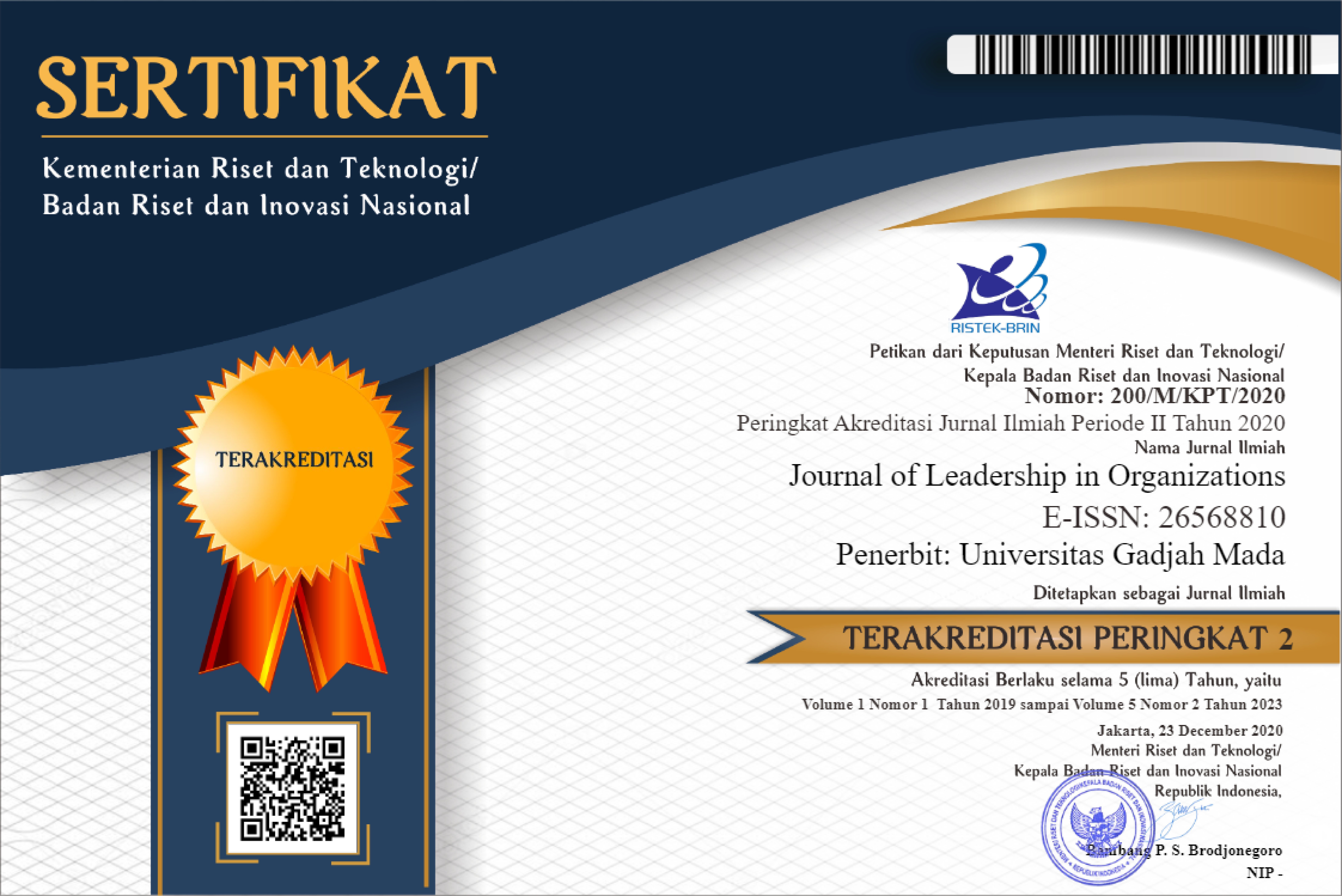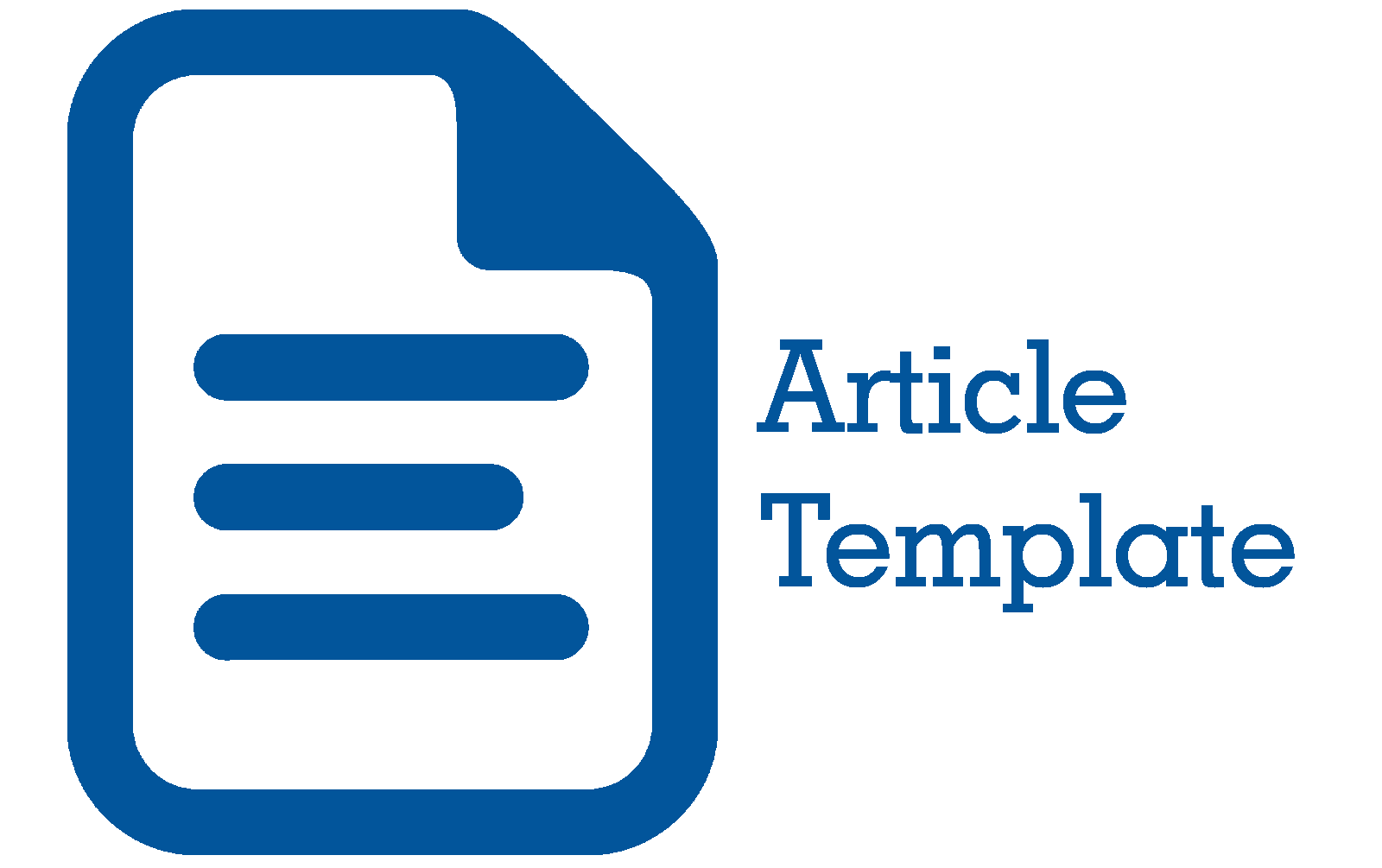Charismatic Leadership Effects of Teachers in Fostering Graduate Quality of Senior High School
Dian Widiantari(1*), Muhammad Iqbal Bin Samadi(2), Abdul Karim(3)
(1) Institut Agama Islam Bunga Bangsa Cirebon, Indonesia
(2) Universiti Kuala Lumpur-Royal College, Malaysia
(3) Universitas Muhammadiyah Cirebon
(*) Corresponding Author
Abstract
Keywords
Full Text:
PDFReferences
Abawi, K. (2013). Data Collection Instruments (Questionnaire & Interview). Training in Sexual and Reproductive Health Research Geneva, 1(Geneva Workshop 2013), 18. http://www.gfmer.ch/SRH-Course-2012/Geneva-Workshop/pdf/Data-collection-instruments-Abawi-2013.pdf
Abdullah, M. Z., Osman, R., & Jaafar, F. M. (2016). Model motivasi kerja guru berdasarkan signifikasi tugas dan pengalaman psikologi. Malaysian Journal of Learning and Instruction, 13(2), 253–286.
Ahmad, N. L., & Majid, N. A. (2018). Program Praktikum Sebagai Medium Pengukuhan Kemahiran Insaniah dalam Kalangan Guru Pelatih. Jurnal Pendidikan Malaysia, 43(2), 17–27.
Ahmad, T. B. T., Nordin, M. S., Razak, N. A., Ibrahim, M. B., & Othman, J. (2018). Pertalian Antara Pengalaman Masteri Dengan Efikasi Kendiri Guru: Regresi-Meta Kajian Keratan Lintang. Malaysian Journal of Learning and Instruction, 14(2), 247–269.
Ajan, A., Mahruddin, A., & Mulyana, M. A. (2018). Efektivitas Kepemimpinan Karismatik Kyai Dalam Meningkatkan Kinerja Guru. Tadbir Muwahhid, 2(1), 33.
Amin, A. M. M., & Othma, N. (2019). Pengurusan Bilik Darjah Guru Baharu yang Mengikuti Program Pembangunan Guru Baharu (PPGB). Jurnal Pendidikan Malaysia, 44(1), 21–27.
Amin, M. (2017). Peran Guru Dalam Menanamkan Nilai Kejujuran Pada Lembaga Pendidikan. Adbir: Jurnal Studi Manajemen Pendidikan, 1(1), 105.
Andina, E. (2018). Efektivitas Pengukuran Kompetensi Guru. Aspirasi: Jurnal Masalah-Masalah Sosial, 9(2), 204–220. https://doi.org/10.46807/aspirasi.v9i2.1103
Andriani, R., & Supiah, Y. L. I. (2021). Effect of problem based learning models on students’ analytical thinking abilities and scientific attitudes in chemistry. Journal of Physic of Conference Series, 1806(1), 1–7.
Badrasawi, K. J. I. (2019). The concept of murabbi in muslim education. Journal International Institute Islamic Thought, 327–358.
Boudreau, J. W., Boswell, W. R., & Judge, T. A. (1999). Effects of Personality on Executive Career Success in the U.S. and Europe. Journal of Vocational Behaviour, 58, 53–81. htp://digitalcommons.ilr.cornell.edu/cahrswp/111
Creswell, J. W. (2012). Educational Research, Planning, Conducting, and Evaluating Quantitative and Qualitative Research (FOURTH EDI). Pearson.
Fahri, M. U., & Isa, S. M. (2018). Data Mining to Prediction Student Achievement based on Motivation, Learning and Emotional Intelligence in MAN 1 Ketapang. International Journal of Model Education Computer Science, 10(6), 53–60.
Fikriyah, Karim, A., Huda, M. K., & Sumiati, A. (2021). Spiritual leadership: The case of instilling values in students through the Kiai’s program in the globalization era. Journal of Leadership in Organizations, 3(1), 16–30. https://doi.org/https://doi.org/10.22146/jlo.63922
Firmiana, M. E., & Nida, F. (2015). Pengaruh loyalitas terhadap kinerja guru SD awal. Jurnal Al-Azhar Indonesia Seri Humaniora, 3(1), 96–108.
Freebody, P. (2004). Qualitative Research in Education: Interaction and Practice. Sage Publications.
Gani, A., Zulaikhah, S., Irsyady, K. A., & Siregar, F. M. (2021). Problem-based Learning and Thinking Style Impact on Information Literacy Skill Improvement among Islamic Education Department Students. Library Pf Philosophy Practice, 1(8), 1–12.
Gartika, N., Setiawati, E., & Hidayat, Y. (2021). The Relationship of Self-Efficacy with Adherence in Restricting Fluid Intake in Middle Adult Hemodialysis Patients. Journal Physic of Conference Series, 1764(1), 1–6.
Gavin, J. H. (2002). Transcendent decision-making: Defining the role of virtue based character in the decision-making process. The University of Texas at Arlington.
Guthrie, G. (2014). Auerbach Qualitative Data. In Basic Research Methods: An Entry to Social Science Research. https://doi.org/10.4135/9788132105961.n15
Handayani, M., & Louise, I. S. Y. (2019). Self-Efficacy of Students Senior High School in Problem Based Learning Model of Chemical Equilibrium Topic. Journal of Physic of Conference Series, 1397(1), 1–8.
Haradhan Mohajan. (2018). Qualitative research methodology in social sciences and related subjects. Journal of Economic Development, Environment and People, 7(1), 23–48.
Hartati, T., Andriani, E. N., Supriatna, N., & Nuriyanti, R. (2021). Development of Children’s Literature Book Based on Primary School Students’ Ecoliteration. Social, Humanities, and Educational Studies (SHEs): Conference Series, 4(1), 152. https://doi.org/10.20961/shes.v4i1.48719
Hussin, H. (2019). Amalan Pengajaran Guru di Pondok Bantan, Nakhon Si Thammarat, Thailand. International Journal of Islamic Thought, 16(1), 24–37.
Irham, I., & Basith, Y. (2018). Revitalisasi Makna Guru Dari Ajaran Tasawuf Dalam Kerangka Pembentukan Karakter. Ulul Albab: Jurnal Studi Islam, 19(1), 44.
Ismail, A., & Mohamad, N. I. (2019). Penyelia dengan motivasi kerja. International Journal of Management Study, 26(2), 99–124.
J Moleong, L. (2007). Metodologi Penelitian Kualitatif. PT Remaja Rosdakarya.
Jannah, W. (2014). Komitmen guru dalam melaksanakan tugas di SMAN kecamatan Rokan IV Koto Kabupaten Rokan Hulu. Jurnal Administrasi Pendidikan, 2(1), 789–796.
Karim, A. (2015). Wanita malam dalam hegemoni superstruktural: Perspektif teori kritis (Penelitian terhadap gadis malam motor matik di kota Cirebon). Nuansa, 8(2), 155–165. https://ejournal.iainbengkulu.ac.id/index.php/nuansa/article/view/393/340
Karim, A. (2016). Inspiration, policy and decision maker. International Conference in CCE Finland.
Karim, A., & Afnan, D. (2020). Kiai interpersonal managerial: Henry Minztberg perspective. Journal of Leadership in Organizations, 2(2), 75–90. https://doi.org/https://doi.org/10.22146/jlo.56290
Karim, A., Faiz, A., Parhan, M., Gumelar, A., Kurniawaty, I., Gunawan, I., Wahyudi, A. V., & Suanah, A. (2020). Managerial leadership in green living pharmacy activities for the development of students ’ environmental care in elementary schools. Journal of Critical Reviews, 7(13), 714–719. https://doi.org/10.31838/jcr.07.13.125
Karim, A., & Hartati, W. (2020). Spiritual tasks of teachers in higher order thinking skills-oriented learning. International Journal of Psychosocial Rehabilitation, 24(8), 4568–4580. https://doi.org/10.37200/IJPR/V24I8/PR280474
Karim, A., Mansir, F., Saparudin, Tumin, & Purnomo, H. (2020). Managerial leadership in boarding and public school: An idea and experience from Indonesia. Talent Development & Excellent, 12(2), 4047–4059. www.iratde.coM
Karim, A., Mardhotillah, N. F., & Rochmah, E. (2017). Dampak kharisma kyai terhadap miliu kesalehan sosial. Seminar Nasional Hasil Penelitian Universitas Kanjuruhan Malang 2017, 1–5. https://semnas.unikama.ac.id/lppm/prosiding/2017/4.PENDIDIKAN/1.AbdulKarim_Nur_Fitri_Mardhotillah_Eliya
Karim, A., Mardhotillah, N. F., & Samadi, M. I. (2019). Ethical leadership transforms into ethnic: Exploring new leader’s style of Indonesia. Journal of Leadership in Organizations, 1(2), 146–157.
Karim, A., Purnomo, H., Fikriyah, F., & Kardiyati, E. N. (2020). A charismatic relationship: How a Kyai’s charismatic leadership and society’s compliance are constructed? Journal of Indonesian Economy and Business, 35(2), 129–143. https://doi.org/https://doi.org/10.22146/jieb.54705
Khareng, M., Machae, R., Khaekphong, H., & Awang, J. (2020). Tahap Profesionalisme Guru Agama dan Keberkesanannya di Maahad Muhammadi Perempuan, Kota Bharu, Kelantan, Malaysia. International Journal of Islamic Thought, 17(1), 78–89.
Lubis, Z., & Anggraeni, D. (2019). Paradigma pendidikan agama Islam di era globalisasi menuju pendidik profesional. Journal Online Studi Al-Qur’an, 15(1), 133–153.
Lussier, R. N., & Achua, C. F. (2016). Leadership Theory, Application (6th Editio).
Muin, A., Hanifah, S. H., & Diwidian, F. (2018). The effect of creative problem solving on students’ mathematical adaptive reasoning. Journal Physic of Conference Series, 948(1), 1–7.
Muslimah, M., Riadi, A., & Mukmin, M. (2021). Implikasi pedagogis Al-Qur’an surah Al-Ahzab ayat 45-48 mengenai tugas dan fungsi guru sebagai pendidik. Ta’dibuna: Jurnal Pendidikan Islam, 10(1), 13.
Mutiara, P. A. (2021). Analysis of mathematical critical thinking skills: The impact of RMS (reading, mind mapping, and sharing) learning model assisted by PPW (props, powerpoint, and worksheet). IOP Conference Series of Earth Environ Science, 1796(1), 1–8.
Newton, P. (2016). Leadership Theories & Practice.
Noha Lazulva Aminin. (2021). Mengukur Loyalitas Guru Swasta MTs dan MA Al-Mawaddah Coper ditinjau dari Gaya Kepemimpinan dan Motivasi Kerja. Institut Agama Islam Negeri Ponorogo.
Noorlizawati, S. Z. W., & Lee, N. (2021). Tanggungjawab Guru Dalam Memperkasakan Pendidikan Menurut Majalah Berbahasa Melayu 1940-an Hingga 1950-an. Malaysian Journal of History, Politic, and Strategy Study, 48(8), 190–211.
Oberhuber, S., & Maurer, I. (2015). Quantitative Data Analysis (pp. 1–26). Text durch Klicken hinzufügen.
Purnomo, H., Karim, A., Rahmatullah, A. S., & Sudrajat, S. (2020). Principals’ personality, leadership, teachers’ job satisfaction and students’ achievement. International Journal of Psychosocial Rehabilitation, 24(08), 4581–4596. https://doi.org/10.37200/IJPR/V24I8/PR280475
Rahim, M. Z. A., Nasri, N. M., & Talib, M. A. A. (2020). Pedagogi Responsif Budaya: Kesedaran, Pengetahuan dan Kesediaan Guru. Jurnal Pendidik Malaysia, 45(1), 25–34.
Rofiqah, S. A., Widayanti, & Rozaqi, A. (2020). Thinking Aloud Pair Problem Solving (TAPPS) Method: The Effect of Understanding Physics Concepts and Communication in High Schools in Indonesia. Journal Physic of Conference Series, 1467(1), 1–9.
Rowen. (2017). Pengaruh Disiplin Kerja dan Loyalitas Kerja terhadap Kinerja Karyawan CV. Tirta Agung Jaya Mandiri. Universitas Sanata Dharma.
Sa’ad. (2017). Pendidikan dan pejuang kharismatik spiritualis (Kajian sosio historis KH. R. As’ad Syamsul Arifin. Edukasia: Jurnal Penelitian Pendidikan Islam, 11(2), 277.
Saripudin, W., & Rosari, R. (2019). Does spiritual leadership model enhance work engagement? Empirical evidence from an Islamic hospital in Yogyakarta. Journal of Leadership in Organizations, 1(2), 112–133. https://doi.org/10.22146/jlo.45520
Selvia, N., Hartono, Y., Indaryanti, S., & Yusup, M. (2020). Students’ high-level thinking skills in creative problem solving learning model. Journal of Physic of Conference Series, 1480(1), 2020.
Skinner, E., Furrer, C., Marchand, G., & Kindermann, T. (2008). Engagement and Disaffection in the Classroom: Part of a Larger Motivational Dynamic? Journal of Educational Psychology. https://doi.org/10.1037/a0012840
Sujudi, N., & Komariah, A. (2020). Leadership Characteristics Era Disruption. International Conference Educational Administration and Management, Vol. 400, 276–279.
Sutisna, D., Indraswati, D., & Sobri, M. (2019). Keteladanan guru sebagai sarana penerapan pendidikan karakter siswa. JPDI (Jurnal Pendidik. Dasar Indonesia), 4(2), 29.
Syaifudin, A. (2018). Perangkat pembelajaran berbasis literasi baru pada era disrupsi. Pertemuan Ilmiah Bahasa Dan Sastra Indonesia, 585–590.
Dwapatesty, E., Gistituati, N., & Rusdinal, R. (2021). Hubungan Gaya Kepemimpinan Karismatik terhadap Motivasi Kerja Guru. Edukatif: Jurnal Ilmu Pendidikan, 3(5), 3000-3006.
Holilah, L., Fatmasari, R., & Rosita, T. (2021). Pengaruh Kepemimpinan Karismatik dan Kompetensi Kepribadian Guru Terhadap Disiplin Kerja Guru. Aksara: Jurnal Ilmu Pendidikan Nonformal, 7(2), 563-576.
Article Metrics
Refbacks
- There are currently no refbacks.
Copyright (c) 2022 Journal of Leadership in Organizations

This work is licensed under a Creative Commons Attribution-ShareAlike 4.0 International License.
| Journal of Leadership in Organizations |
| Journal of Leadership in Organizations (JLO), with registered number ISSN 2656-8829 (Print) and ISSN 2656-8810 (Online), is published by the Center for Leadership Studies, Department of Management, Faculty of Economics and Business, Universitas Gadjah Mada. The content of this website is licensed under a Creative Commons Attribution-ShareAlike 4.0 International License |
| © 2019 Journal of Leadership in Organizations | |





_logo2.png)


.png)




